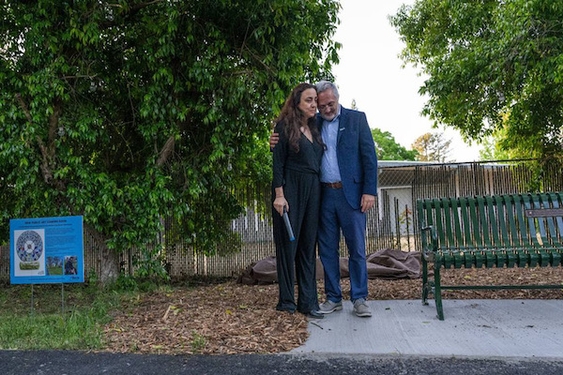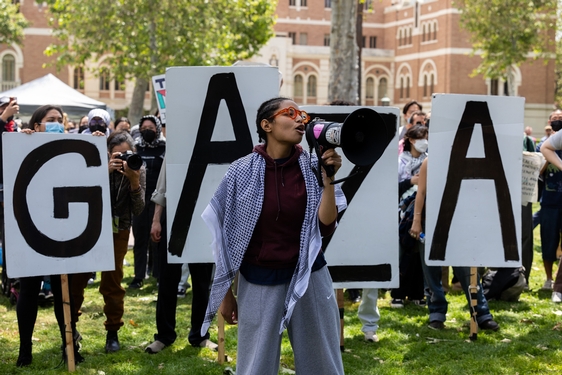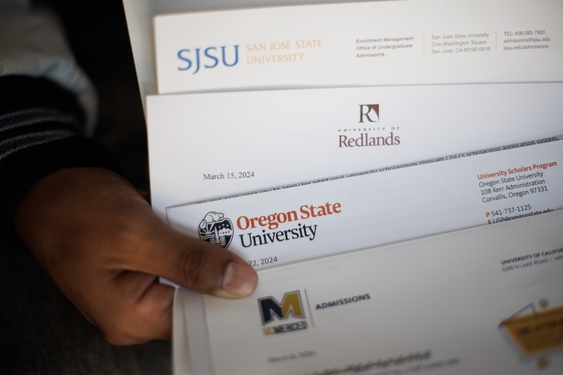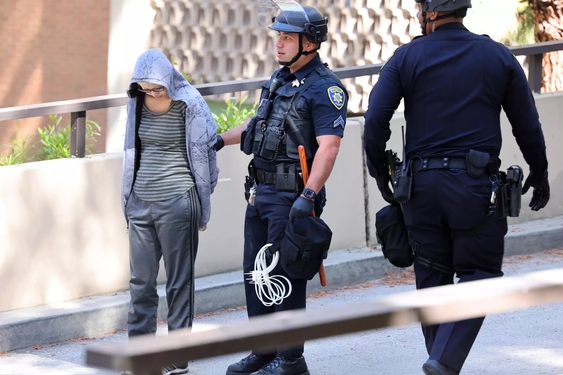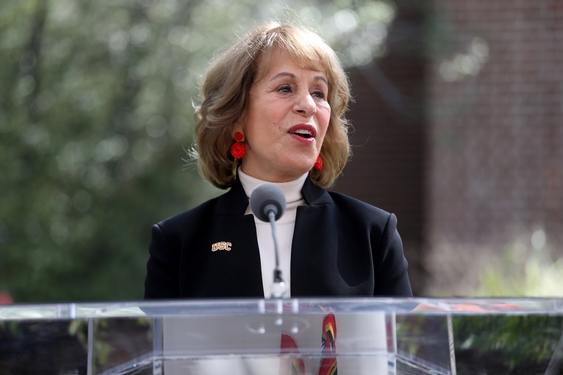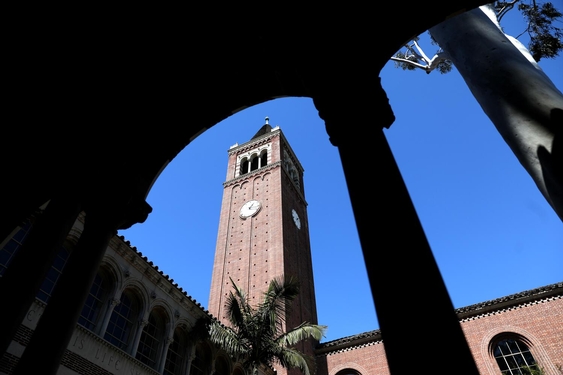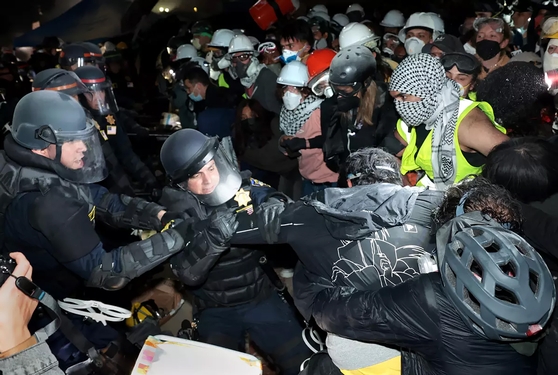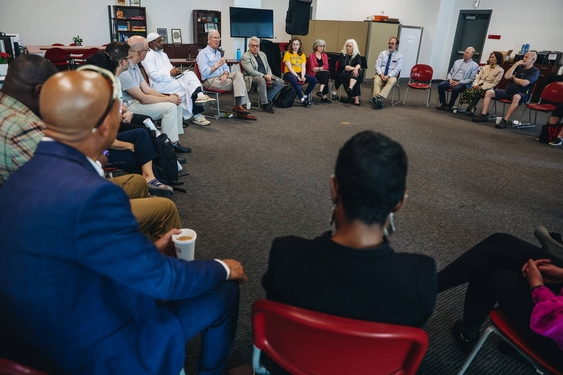Majdi Abou Najm feels like time stopped a year ago when he learned his 20-year-old son, Karim Abou Najm, was brutally killed on his way home through a Davis park.
His son was a computer science major at UC Davis student just six weeks from his graduation. He was an aspiring software engineer with an impressive academic career and two jobs lined up after his graduation that June. But all that ended April 29, 2023, on a bike path at Sycamore Park.
“The world is trying to push me back to what they call ‘normal’,” the still grieving father said to over 100 people gathered Monday evening to remember and honor his son. “But what is normal? And how can anything be normal? Our society is not prepared to deal with grief, and the expectation is that we deal with it as quickly as possible and go back to normal.”
The UC Davis student was among three people stabbed, including David Henry Breaux and Kimberlee Guillory, in seemingly random attacks over several days before a suspect was arrested. Breaux was also killed; Guillory survived serious injuries.
The young man accused of committing the brutal stabbings, Carlos Reales Dominguez, once had a promising future as a UC Davis student but was apparently in a downward spiral of mental illness. Reales Dominguez faces charges of murder and attempted murder in the three stabbings.
Majdi Abou Najm, an associate professor of soil biophysics at UC Davis, wants people to speak more openly about mental health to destigmatize the subject, so more people can get the help they need.
“If you need help or if you know someone who does, open up. Feel no stigma, no shame or anxiety about opening up,” the father told the audience. “And if it helps, let me open up. I need help. I lost my son. I surely need help. And there’s no shame in that.”
Abou Najm’s family, Davis city officials and UC Davis students organized a “Day of Remembrance” Monday at Willett Elementary School for a discussion on mental health. Following the discussion, those who attended the event walked through the school parking lot to nearby Sycamore Park.
There, Abou Najm’s family unveiled a memorial bench and the naming of a bike path in honor of his son.
“May this bench forge new friendships, create happy and lasting memories, and be a refuge to reflect, to meditate or to remember,” the father said. “We hope it creates a safe and peaceful space to inspire curious discussions and illuminate new ideas.”
Sara Halabi Hakim, a UC Davis student and a childhood friend of Karim, was among those who attended Monday’s event. She said remembering what happened to her friend made it difficult to attend.
“It’s like what Karim’s father said, life gets in the way and you go back to normal,” she said. “And then you remember things that happened that aren’t normal. It gets hard to be reminded of these things.”
But Halabi Hakim said her friend wouldn’t have let her by with that. He would’ve encouraged her to push through and seek the positive.
Nadine Yehya, Karim Abou Najm’s mother, said she has learned in the past year not to hide her emotional wounds. She’s also learned that talking about pain helps people process that pain.
“We are here today, which means the unthinkable has happened,” she said about her son’s death. “There’s no way around it, denying it or ignoring it. But how could it be? We hear about tragedies in the news. We see them in movies. We think bad things can’t happen to good people, but we are wrong. Unfortunately, it’s more common than we think.”
Yehya, who is a communication specialist and science writer at UC Davis, said we don’t choose our calamities, but we do choose how to respond to them. She has chosen to preserve her son’s memory.
“When tragedy hits, we don’t get the chance to change the channel, to fast-forward the movie,” Yehya told the audience. “We have to survive it. We have to live our worst nightmare.”
She spoke about a public art memorial that will be placed near the bench honoring her son, not far from where he was found along the bike path with multiple stab wounds that Saturday night. She said the circular, colorful art piece will reflect the sunlight and shimmer, reminding Davis residents of her son.
“While my son’s blood was here, I want the life of Karim to be remembered and carried forward,” the mother said. “He didn’t get to do everything he wanted, but he lived life and he lived it more abundantly.”
Mary Croughan, UC Davis provost and executive vice chancellor, told the audience that it’s “absolutely terribly painful” when you lose someone, such as Karim, whose life was just beginning to unfold with a future full of possibilities.
“We ask ourselves in the aftermath of this tragedy ‘What we can do?’ And that has certainly been the focus here this evening,” Croughan said. “We want to understand, and we want to heal. We gather to talk about loss, to remember that we are not alone.”
Bapu Vaitla, vice mayor of Davis, unveiled the naming of the bike path in honor of the slain UC Davis student. He said the world would be a much better place had Karim Abou Najm had been granted more than the 20 years of his life. But his legacy remains.
“All of us here today, whether we realize it or not, retain pieces of Karim,” Vaitla told the audience. “His joy, his brilliance, his kindness.”
____
©2024 The Sacramento Bee. Visit at sacbee.com. Distributed by Tribune Content Agency, LLC.


